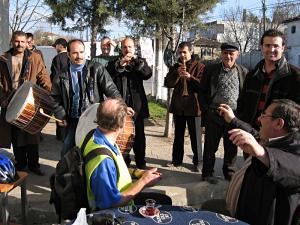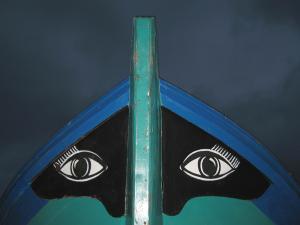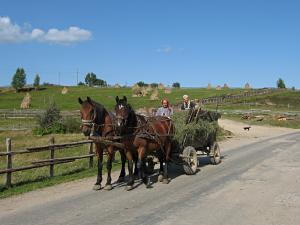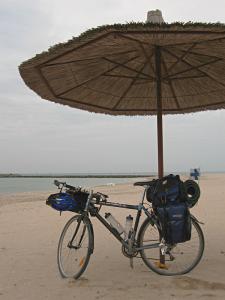Arto's Blog
Please come to have some tea
Posted: 2006-12-05 12:57:15, Categories: Travel, Bulgaria, Turkey, Cycling, 897 words (permalink)
 Our last days in Bulgaria were spent traveling slowly along the Black
Sea coast until the town of Tzarevo, then taking mostly very small
roads until Malko Tarnovo. Erte, the Lithuanian guy, had a small accident
on the way which delayed us for a couple of days, but he's okay now.
We also met a friendly Frenchman making money with real estate and building his
dream house in Sozopol, chatted with an elderly painter in Tzarevo and
took photos of horses walking freely on the meadows by the Veleka
river. After Malko Tarnovo we crossed the border to Turkey.
Our last days in Bulgaria were spent traveling slowly along the Black
Sea coast until the town of Tzarevo, then taking mostly very small
roads until Malko Tarnovo. Erte, the Lithuanian guy, had a small accident
on the way which delayed us for a couple of days, but he's okay now.
We also met a friendly Frenchman making money with real estate and building his
dream house in Sozopol, chatted with an elderly painter in Tzarevo and
took photos of horses walking freely on the meadows by the Veleka
river. After Malko Tarnovo we crossed the border to Turkey.
This time it was immediately obvious that we had arrived to a different country. Every village would have at least one mosque, from where the imam would raise the call for prayer five times per day. Coffee shops and restaurants were full of men, usually drinking tea and smoking cigarettes. Later we would find out that in bigger towns it was not uncommon to order a beer, too. But even there, you wouldn't see a woman enter a bar, even with her husband. In Istanbul that's possible and even common, we've been told, but we're not there yet.
Our first stop in Turkey was Dereköy, the first village after the border. It was raining when we arrived, and a local restaurant owner invited us to warm up in his cafeteria. After that the son of the sheriff said he could offer us a safe place to camp so we moved to another cafe to have tea with the locals and to wait for the sheriff. Eventually he never arrived but our hosts would not leave us in trouble: we laid our sleeping bags on the floor of the town planning office.
Since then we have been invited for a tea numerous times. Everybody wants to exchange a few words with the strange traveling cyclists, although it's often difficult due to the language barrier. Kids are the best: everyone can ask in good English at least "What's your name" and "Where do you come from". Some of them may also beg for money after that, but especially in villages they surround us simply for pure curiosity. They are also eager to pose for photos whenever they see us carrying cameras. The tea, by the way, is black tea and usually fairly strong, served always in the same kind of small glasses, with two cubes of sugar placed next to the glass.
When we happen to come across adults who speak English or German, they'll certainly ask what we think about Turkish people and whether we believe Turkey will be accepted to join the European Union. People at least in this part of the country are generally very positive towards EU and want to communicate and spend time with us. In Kirklareli a wealthy shop owner took the whole evening and good part of the following day to walk and drive us around in his city. Whatever we wanted to do he would show us the best in town: the best restaurant for lunch, the best shop for sweets, the best cheese and warm milk for breakfast, the best vegetables for the road, all of which were sold by his friends of course. However, the purpose of the tour was not to squeeze out our last liras — instead he went on to offer us a long night of eating and drinking (including a bit of scary drunken driving) out of his own pocket.
Another topic which will quickly turn up in any longer discussion is religion. People are very eager to point out that all muslims are not terrorists and that both christians and muslims believe in the same God, although in different ways. They also want to know what is our religion. A special addition has been the recent visit of the Pope. Turkey itself is interesting as being a muslim country but probably the most liberal and westernized of them, especially the European part of it. Alcohol is readily available in shops, women don't cover their faces when walking outside, and even official school uniforms of young girls can feature short skirts which end above the knees.
In the small village of Poyrali we were invited to join a Turkish wedding. First we were treated to a meal in one of the local restaurants and in the evening we joined the wedding party with a few hundred other guests. It consisted mainly of dancing to traditional music which was played using drums and kind of flutes. In the picture you can see the wedding band practising by playing for us in the afternoon. Surprisingly there were no food or drinks available at the party place, except for raki (a strong alcohol) and cheese which were cheerily offered to us just before the entrance. We were told that weddings normally continue until morning hours, but this time it ended already before ten in the evening. That was probably due to the cold weather as the whole party was held outdoors.
Yesterday we arrived to the Black Sea coast again, I'm posting this in the fishing village of Kiyiköy. We're only about 150 km away from Istanbul but at our current speed of travel arriving there will take nearly a week — accepting all those invitations for tea takes time. :) But we're enjoying it, so there's no need to hurry.
Holiday apartment at Sunny Beach
Posted: 2006-11-22 10:39:27, Categories: Travel, Bulgaria, Hospitality exchange, 563 words (permalink)
 A couple of days after leaving Varna, a November heat wave arrived in
Bulgaria and we were enjoying 20 degree and even higher temperatures
for a few days. By accident we got also a holiday apartment near one
of the most famous beaches to match the weather.
A couple of days after leaving Varna, a November heat wave arrived in
Bulgaria and we were enjoying 20 degree and even higher temperatures
for a few days. By accident we got also a holiday apartment near one
of the most famous beaches to match the weather.
Both Bulgarian and Romanian parts of the Black Sea coast have plenty of beach resorts which attract a large number of tourists during the summer and become almost deserted in the winter. Especially in Bulgaria investors seem to believe that more money is still waiting for takers. Hundreds of new hotels, villas and apartment buildings are being constructed and roadsides are cluttered with advertisements of the real estate companies.
We had just decided to take a look at the beach at a resort called Sunny Beach, when a friendly Bulgarian couple in their fifties came to talk to us. They were fascinated about our trip and invited us to stay at their place if we had time. Well, we had. :) It turned out that our new friends who lived in Sofia had recently bought not only one but two holiday apartments in a nearby apartment complex and we were offered to borrow one of them. So after three nights of camping we had like a package holiday weekend: beach, sunshine, swimming, short walk to a shiny new two-room flat with all the modern comforts. Just the crowds were missing.
Actually better than the beach at least at this time of the year was the historic town of Nesebar, which was also just a short walk from Sunny Beach. Nesebar is famous for ruins of ancient churches built between the 6th and 14th centuries. Old wooden and stone houses along narrow cobblestone streets gave it a fairy-tale town feel, especially now during off-season when it wasn't filled with tourists. We also loved the small port full of bright colors: nicely painted fishing boats floating next to the graffiti decorated pier. The picture I chose for this blog entry is a front view of one of the boats at night. As the sugar on top, in a restaurant in Nesebar we tasted superb grilled bluefish, the best fish meal during the whole trip this far.
After Sunny Beach and Nesebar just 20 km along the coast we found one of the best camping places on the trip. It was on the sea shore less than a kilometer from the main road, but nicely hidden so that we didn't need to worry about getting unexpected visitors. The sea had carried plenty of loose pieces of wood on the shore, so we made a campfire and sat around it listening to the sound of waves hitting the nearby rocks. The holiday apartment had been nice, but camping at that place still felt more like a traveler's way to live. We had even one more guy to chat with: another Lithuanian friend who traveled five days by bus and train to meet erte.
Yesterday we arrived in Burgas, walked around in the city a bit and went to a salsa party in the evening with a local Hospitality Club member. The city tour itself was not terribly interesting (except for the seaside park and the party, which were nice) but we met Emile, a 51-year old Belgian cyclist who's also on a long tour. So now we are three, heading towards Istanbul together.
Romania and Bulgaria joining the EU
Posted: 2006-11-13 19:36:47, Categories: Travel, General, Romania, Bulgaria, 722 words (permalink)
 Both Romania and Bulgaria will join the European Union from the
beginning of year 2007. On the streets it hasn't been much visible
except for various signs telling about EU supported renovation and
construction projects, but in conversations it's naturally a hot
topic.
Both Romania and Bulgaria will join the European Union from the
beginning of year 2007. On the streets it hasn't been much visible
except for various signs telling about EU supported renovation and
construction projects, but in conversations it's naturally a hot
topic.
In both countries people in cities seems to be generally optimistic but there are also many who aren't really happy about the whole process. The marketing folks touted about more prosperity and other advantages, while critical voices during the negotiation process were few and far between. As the big date approaches also the less rosy aspects of EU integration are becoming more apparent.
Prices are rising, people say, while salaries are not. In particular property prices have climbed out of reach from ordinary people trying to save towards an apartment or house. After the collapse of communism apartments were generally given to the people living in them. Therefore most people have a place to stay, but for a young couple wishing to start a family the situation is difficult. Beneficiaries have been mostly the rich who have been able to work through corrupted municipality administrations. They are building ugly-looking but luxurious hotel complexes in places of natural beauty, eagerly waiting for new tourists.
EU will also impose new rules on the production of food, taxes on home-made alcohol and possibly outlaw certain traditional dishes. Otherwise most wouldn't care much of the whole EU thing, but invasions to the traditional ways of life is making people angry. Bulgarians have named their chief negotiator "the yes lady", saying she gave up too easily to all EU demands in order to guarantee the acceptance of Bulgaria for integration.
More positive changes brought by EU include efforts to reduce corruption, to fight organized crime, to increase transparency in the justice system and to improve the rights of ethnic minorities. There are also EU requirements concerning waste management and environmental protection which will hopefully result in a healthier environment for everybody.
Most of the debate around EU is centered around money. That's not a surprise, as it's a primarily economy-driven union. There may be some hard times in the beginning, but I have no doubts that eventually it will bring more wealth to the new regions. A more subtle question are the changes it will bring to the lifestyle. It's good if everyday life will become a bit easier and people will have more choice what to do with their lives. On the other hand, if every horse cart will be replaced by a tractor, if people will get their wine from a shop instead of their own or friend's barrel, if shepherds won't be following their sheep over beautiful hilly grasslands any more, something important will be lost forever.
Of course a lot of the changes have already been happening and would happen also without EU. It's the result of entering market economy and global markets after a long period of communism. Joining the EU will just speed up the whole process. Many young people have already for years moved abroad to gain better salaries and virtually every family has some family members or close friends working outside their homeland. EU will obviously make this even easier and it remains to be seen how many will return.
A detail which several Romanians mentioned to me is that while several Western European countries put restrictions on work permits for people coming from new EU member states, Finland decided to open doors for everybody. Traditionally Finland has been quite restrictive towards immigration, so it's interesting to see that in this case we're more open than many other EU member states.
Travelers in both Romania and Bulgaria are happy that becoming an EU citizen will mean visa-free travel to a larger number of countries. Curiously the change is not so big concerning traveling in Europe - neither Romanians nor Bulgarians have required visas for most European countries for years - but several Asian, South American and African countries will become easier to access after joining the EU.
One small change we'll all notice is that new banknotes will carry the text EBPO in addition to EURO and EYPΩ. Bulgarians are proud to mention that the cyrillic alphabet was invented by them (not Russians) and now it will become the third official alphabet in the European Union. Cool. :)
Autumn weather on the Black Sea coast
Posted: 2006-11-08 13:57:15, Categories: Travel, Romania, Bulgaria, 461 words (permalink)
 After Tulcea the weather started getting colder and windier. On the
first day we enjoyed roads lined with colourful trees with the wind
pushing us forwards. The following day we occasionally struggled to
advance even at walking speed while being beaten by a shower of
vertically flying sand from a nearby field. There was also some rain,
although mostly at night time. We passed many beautiful beaches but
didn't really feel like swimming. Riding through beach resort towns
was like trespassing abandoned land.
After Tulcea the weather started getting colder and windier. On the
first day we enjoyed roads lined with colourful trees with the wind
pushing us forwards. The following day we occasionally struggled to
advance even at walking speed while being beaten by a shower of
vertically flying sand from a nearby field. There was also some rain,
although mostly at night time. We passed many beautiful beaches but
didn't really feel like swimming. Riding through beach resort towns
was like trespassing abandoned land.
When entering Bulgaria it got even better: rain turned into sleet. After that the sun came out again and it all looked like a beautiful summer day - except that we were wearing all our clothes. One night we camped on cape Kaliakra and left a kettle half full of water outside during the night, discovering a thick layer of ice on top in the morning. I'm carrying a lightweight sleeping bag and it was approaching the limits of comfort.
Other than the coldness, cape Kaliakra was one of the most gorgeous camping places ever. We pitched our tents on a patch of grass just a few meters from a vertical drop of several dozen meters down to the sea. Full moon was casting a path of light on the water in front and ancient ruins provided wind protection in the back. I guess camping there wasn't officially permitted, but it wasn't explicitly forbidden in the rules of the area either. ;-)
My average daily cycling distances have become shorter than in the beginning of the journey. It's partly because Erte's riding speed is a bit slower than mine and we are making a lot of stops for taking photos, but mainly because the days have become shorter. Already before five o'clock in the afternoon we need to start thinking about where to stay. The sun sets after five and by six it's already dark. By going south I can maybe avoid snowstorms but cannot enjoy such long days as during summers in Northern Europe. Or at least to do that I'd need to go far, far further south.
Bulgarian part of the Black Sea coast is more hilly than the Romanian one. The vegetation is thicker and more lush, hinting we're in a warmer zone even though the temperature hasn't given that impression all the time. However, the biggest change has been the language. Romanian is based on Latin and I was able to pick it up a little bit during my stay there. Bulgarian belongs to the group of Slavic languages, which makes communication easier for Erte who speaks Russian but harder for me. At least I finally made the effort of learning the cyrillic alphabet so that I can read signs and other texts here.

Copyright Arto Teräs <ajt@iki.fi>, licensed under the Creative Commons Attribution-Share Alike 3.0 Unported License. (Unless otherwise mentioned in individual photos or other content.)